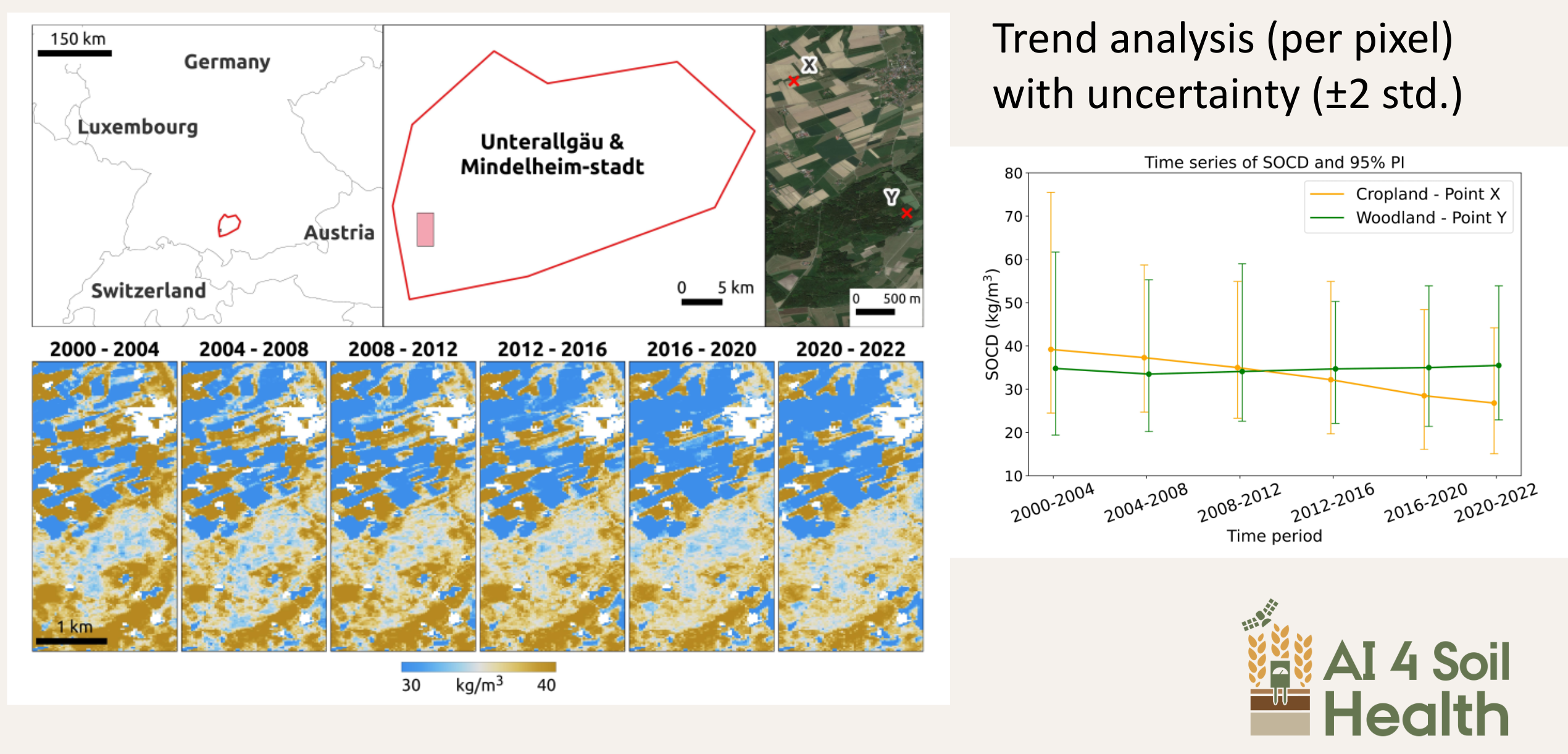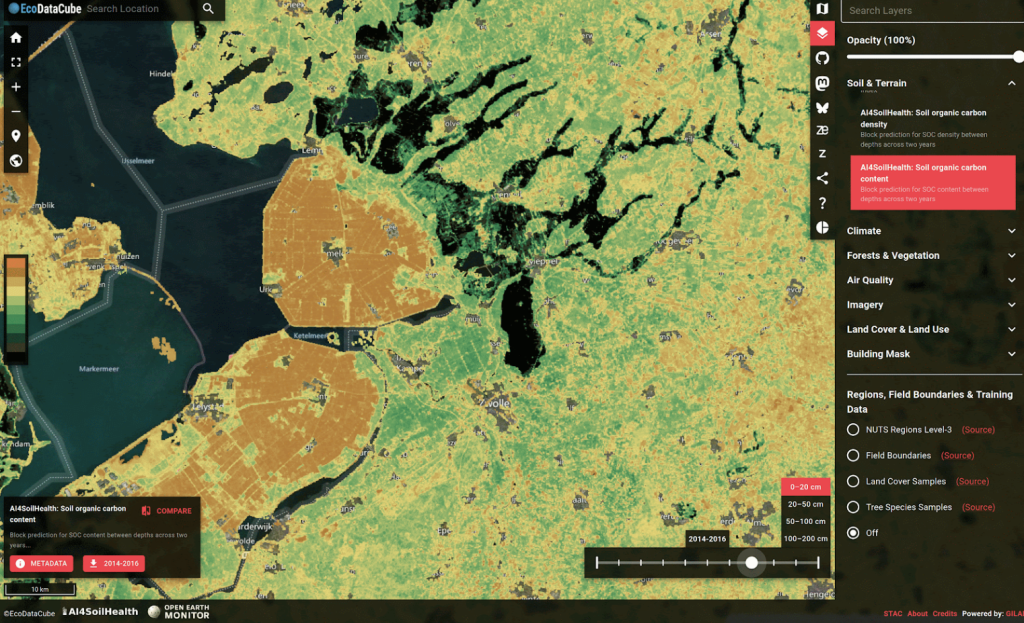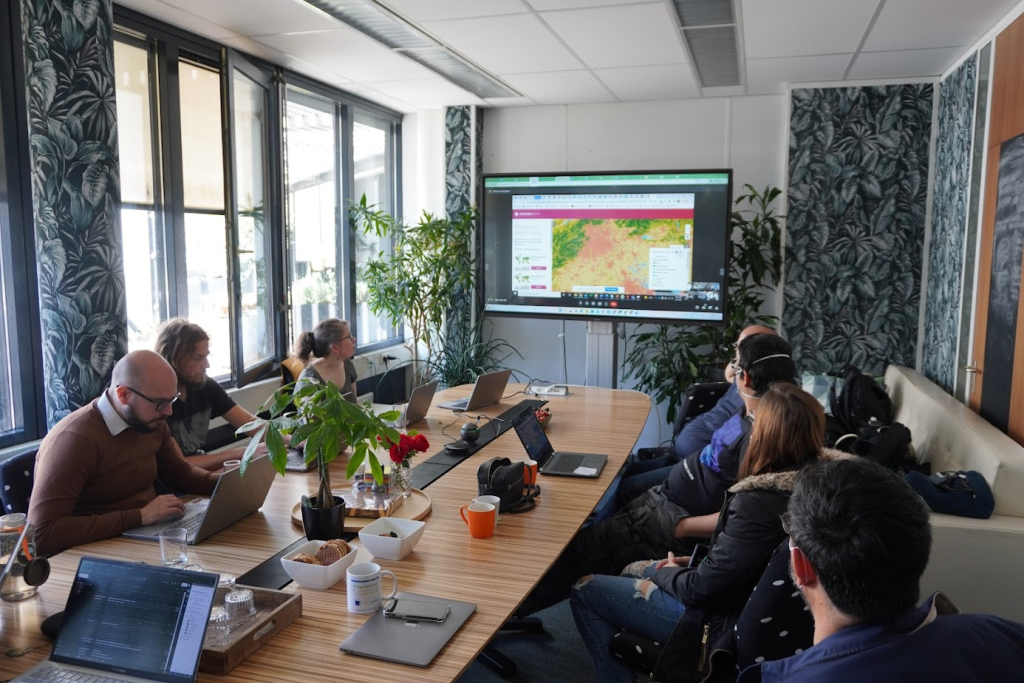Application Deadline: 1st of January 2025
Possible start date: 1st of March 2025
Duration: 2+ years,
Job location: Waldeck Pyrmonthlaan 14, Doorwerth, the Netherlands
Brutto monthly salary: starts at €3.877 gross per month, depending on years of experience, up to €5.090 gross
Job type: post-doctoral researcher
Fields: pedometrics, Machine Learning, geocomputation, soil datasets and soil databases, environmental sciences, Earth observation, data science, high-performance computing
Employer: OpenGeoHub Foundation
Job description
OpenGeoHub foundation is a not-for-profit research foundation with headquarters in Doorwerth (half-way between Wageningen & Arnhem), the Netherlands. We aim to become world experts in producing global and regional spatial predictions of soil, vegetation, biodiversity and climatic variables. For this, we use high performance computing / optimisation and state-of-the-art machine learning.
OpenGeoHub foundation is looking for 1–2 assistant researchers / post-doctoral researchers in the field of pedometrics, geo-computation, soil data modeling and geoinformatics (programming in R, Python, Bash, Julia and similar), specifically focused on using state-of-the-art geocomputing frameworks / algorithms and GIS software to help import, organize and model multivariate static and dynamic soil variables for the purpose of producing global and European datasets (Open Soil Data Cubes) either by running analysis, statistical modeling or by running process-based models. You would work for OpenGeoHub on current and future high profile European Commission-funded and other international projects where there is a need to develop new solutions for measuring and modeling soil and ecosystem variables, run geocomputing, optimize and automate modeling frameworks and deliver scientific outputs in a timely manner. You would primarily contribute to the Horizon Europe projects AI4SoilHealth (2023–2026) and Open-Earth-Monitor (2022–2026); also actively contribute to WRI Land Carbon Lab project and the www.OpenLandMap.org and EcoDataCube.eu data portals.
You would spend a significant amount of time innovating solutions to produce more accurate and easier to update spatial and spatiotemporal predictions of soil properties and classes, then report the results in research publications, meeting with senior researchers (weekly), and using our own computing center to optimize spatial analysis. You would also be encouraged to network with other researchers and groups of world leaders in their fields. OpenGeoHub works closely with University of Aarhus, Center for Ecology and Hydrology (CEH) UK, EU Soil Observatory at JRC (EUSO), IIASA (Geo-wiki.org), Wageningen University (Laboratory of Geo-information Science and Remote Sensing), EURAC Research, ETH (Tom Crowther’s Lab), The Woodwell Climate Research Center, Max-Planck-Institute for Biogeochemistry (Biogeochemical Integration Department), Institute for Geoinformatics (ifgi) / University of Münster, GFZ Helmholtz German Research Centre for Geosciences, GiLAB.rs, and many other organizations. Our clients / collaborating organizations also include: The Nature Conservancy, UNCCD, World Resources Institute, Conservation International and others.
Successful candidates will be encouraged / supported to apply for the 30% ruling which can lead to additional financial and other benefits.
Your profile
Minimum requirements:
- You have a MSc and/or PhD degree in the field of pedometrics and/or environmental science and/or geoinformatics; combined with a background in GIS, geocomputation, and/or statistics.
- You are independent in running geocomputing in R and/or Python and/or Bash and can document processing workflows in Quarto or similar.
- You have experience with predictive soil mapping using Machine Learning in modeling frameworks such scikit-learn, mlr3, tidymodels and similar.
- You are competent at, and enjoy developing analytical solutions, producing value-added datasets, writing up and reporting research / results of experiments.
- You know how to automate benchmarking and optimize geocomputing to save computing costs without losing on accuracy.
- You have experience working with soil measurements based on laboratory methods and/or soil spectroscopy.
- You are fluent in English.
- Note: if you are a non-EU citizen older than 30 years, according to the Dutch Immigration rules from 2022, Dutch immigration office (IND) might require that you show proof of a PhD degree obtained from the top 200 universities.
INFORMATION AND APPLICATION
Questions:
Questions regarding this position can be directed to Tom Hengl, email: tom.hengl@opengeohub.org . Applications, including (1) a CV, (2) a statement of your interest and vision, and (3) a self-assessment based on the minimum requirements, should be uploaded via this link. Please prepare all documents as a PDF before starting the application. You can also apply for this position if you do not have a PhD degree, however the salary scales mentioned above would not apply and would require an adjustment.
Our offer:
We offer a full-time position for 2+ years, with possible extension, within a very stimulating international innovation and research environment aimed at solving global and regional environmental problems at large scales. You will work in a dynamic work environment with enthusiastic colleagues usually from a variety of countries.
- Salary starting at €3.877 gross per month depending on experience;
- A holiday allowance of 8% of the gross annual salary;
- Minimum of 29 holidays if in full-time employment;
- Professional and personal development programs.
We are a truly international research institute promoting equal opportunities and especially focused on enabling female researchers. We strongly encourage a high degree of responsibility and independence, while collaborating with other colleagues. Flexi-hours and occasional remote working are also possible upon agreement with the OpenGeoHub Management Board.
“Join us in producing next-generation Open soil data to support large-scale land restoration projects and enabling landowners tracking their soil-health”



